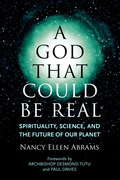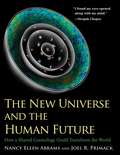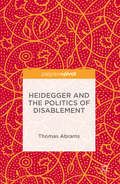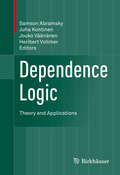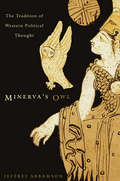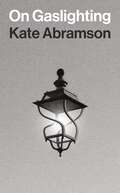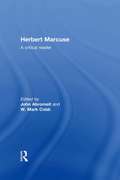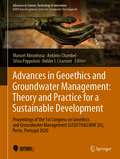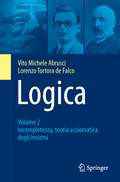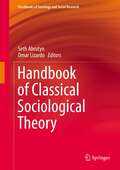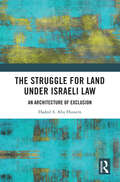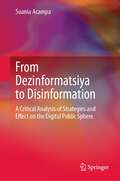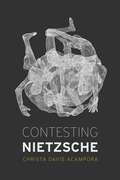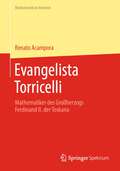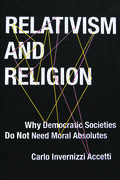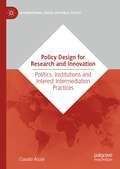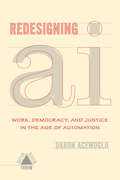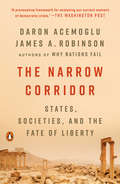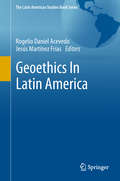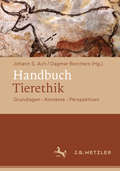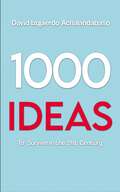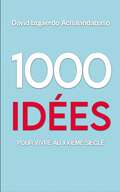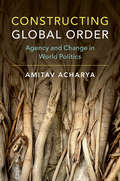- Table View
- List View
A God That Could Be Real
by Nancy Abrams Paul Davies Archbishop Desmond TutuA paradigm-shifting blend of science, religion, and philosophy for agnostic, spiritual-but-not-religious, and scientifically minded readers Many people are fed up with the way traditional religion alienates them: too easily it can perpetuate conflict, vilify science, and undermine reason. Nancy Abrams, a philosopher of science, lawyer, and lifelong atheist, is among them. And yet, when she turned to the recovery community to face a personal struggle, she found that imagining a higher power gave her a new freedom. Intellectually, this was quite surprising. Meanwhile her husband, famed astrophysicist Joel Primack, was helping create a new theory of the universe based on dark matter and dark energy, and Abrams was collaborating with him on two books that put the new scientific picture into a social and political context. She wondered, "Could anything actually exist in this strange new universe that is worthy of the name 'God?'" In A God That Could Be Real, Abrams explores a radically new way of thinking about God. She dismantles several common assumptions about God and shows why an omniscient, omnipotent God that created the universe and plans what happens is incompatible with science--but that this doesn't preclude a God that can comfort and empower us. Moving away from traditional arguments for God, Abrams finds something worthy of the name "God" in the new science of emergence: just as a complex ant hill emerges from the collective behavior of individually clueless ants, and just as the global economy emerges from the interactions of billions of individuals' choices, God, she argues, is an "emergent phenomenon" that arises from the staggering complexity of humanity's collective aspirations and is in dialogue with every individual. This God did not create the universe--it created the meaning of the universe. It's not universal--it's planetary. It can't change the world, but it helps us change the world. A God that could be real, Abrams shows us, is what humanity needs to inspire us to collectively cooperate to protect our warming planet and create a long-term civilization.From the Hardcover edition.
The New Universe and the Human Future: How a Shared Cosmology Could Transform the World (The Terry Lectures Series) (The Terry Lectures Series)
by Nancy Ellen Abrams Joel R. PrimackA cultural philosopher and an astrophysicist attempt to decipher how we fit into the universe, and the impact our placement has on us. After a four-century rupture between science and the questions of value and meaning, this groundbreaking book presents an explosive and potentially life-altering idea: if the world could agree on a shared creation story based on modern cosmology and biology—a story that has just become available—it would redefine our relationship with Planet Earth and benefit all of humanity, now and into the distant future.Written in eloquent, accessible prose and illustrated in magnificent color throughout, including images from innovative simulations of the evolving universe, this book brings the new scientific picture of the universe to life. It interprets what our human place in the cosmos may mean for us and our descendants. It offers unique insights into the potential use of this newfound knowledge to find solutions to seemingly intractable global problems such as climate change and unsustainable growth. And it explains why we need to &“think cosmically, act globally&” if we're going to have a long-term, prosperous future on Earth.&“Should be read by anyone, not just scientists, who worry about the human condition.&”—Deepak Chopra, The Huffington Post&“A prophetic book. Its message ranks right up there with those of Isaiah, Jeremiah, Ezekiel, and Joel. Like the prophets, it is at times poetic, demanding, grounded, soaring, empowering, and always awe-inspiring.&”—Matthew Fox, Tikkun&“The ideas and images are fascinating and certainly contribute to a sense of the profound stakes involved in what we&’re doing to the planet and ourselves.&”—William Kowinski, North Coast Journal
Heidegger and the Politics of Disablement
by Thomas AbramsThis book presents the early existential phenomenology of Martin Heidegger as a way to reformulate academic disability studies and activist disability politics. It redresses the almost categorical neglect of human difference in the philosophy of Heidegger. It proceeds by applying a revised version of his phenomenology to social policy aimed to get disabled persons to work and to methods in rehabilitation science intended to be more 'client friendly'. Phenomenological philosophy is extended to the topic of disability, while, at the same time, two key concerns facing disability studies are addressed: the roles of capitalism in disablement, and of medical practice in the lives of disabled persons. By reframing disability as a lived way of being in the world, rather than bodily malfunction, the book asks how we might rethink medicine and capitalism in democratic ways. It aims to transform Heidegger's work in light of his troubling politics to produce a democratic social theory of human difference.
Dependence Logic
by Samson Abramsky Juha Kontinen Jouko Väänänen Heribert VollmerIn this volume, different aspects of logics for dependence and independence are discussed, including both the logical and computational aspects of dependence logic, and also applications in a number of areas, such as statistics, social choice theory, databases, and computer security. The contributing authors represent leading experts in this relatively new field, each of whom was invited to write a chapter based on talks given at seminars held at the Schloss Dagstuhl Leibniz Center for Informatics in Wadern, Germany (in February 2013 and June 2015) and an Academy Colloquium at the Royal Netherlands Academy of Arts and Sciences (March 2014). Altogether, these chapters provide the most up-to-date look at this developing and highly interdisciplinary field and will be of interest to a broad group of logicians, mathematicians, statisticians, philosophers, and scientists. Topics covered include a comprehensive survey of many propositional, modal, and first-order variants of dependence logic; new results concerning expressive power of several variants of dependence logic with different sets of logical connectives and generalized dependence atoms; connections between inclusion logic and the least-fixed point logic; an overview of dependencies in databases by addressing the relationships between implication problems for fragments of statistical conditional independencies, embedded multivalued dependencies, and propositional logic; various Markovian models used to characterize dependencies and causality among variables in multivariate systems; applications of dependence logic in social choice theory; and an introduction to the theory of secret sharing, pointing out connections to dependence and independence logic.
Minerva's Owl: The Tradition of Western Political Thought
by Jeffrey B AbramsonAs Hegel famously noted, referring to the Roman goddess Minerva, her owl brought back wisdom only at dusk, when it was too late to shine light on actual politics. Jeffrey Abramson provides a lively and accessible guide for readers discovering the tradition of political thought that dates back to Socrates and Plato, with contemporary examples that illustrate the enduring nature of political dilemmas.
On Gaslighting (Insights: Philosophy in Focus)
by Kate AbramsonA philosopher examines the complicated phenomenon of gaslighting&“Gaslighting&” is suddenly in everyone&’s vocabulary. It&’s written about, talked about, tweeted about, even sung about (in &“Gaslighting&” by The Chicks). It&’s become shorthand for being manipulated by someone who insists that up is down, hot is cold, dark is light—someone who isn&’t just lying about such things, but trying to drive you crazy. The term has its origins in a 1944 film in which a husband does exactly that to his wife, his crazy-making efforts symbolized by the rise and fall of the gaslights in their home. In this timely and provocative book, Kate Abramson examines gaslighting from a philosophical perspective, investigating it as a distinctive moral phenomenon.Gaslighting, Abramson writes, is best understood as a form of interpersonal interaction, a particular way of fundamentally undermining someone. The gaslighter, Abramson argues, aims to make his target experience herself as incapable of reasoning, perceiving, or reacting in ways that would allow her to form appropriate beliefs, perceptions, or emotions in the first place. He seeks not only to induce in her this unmoored sense of herself but also to make it a reality. Using examples and analysis, Abramson gives an account of gaslighting and its immorality, and argues that such a discussion can help us understand other aspects of social life—from racism and sexism to the structure of interpersonal trust.
Max Horkheimer and the Foundations of the Frankfurt School
by John AbromeitThis book is the first comprehensive intellectual biography of Max Horkheimer during the early and middle phases of his life (1895-1941). Drawing on unexamined new sources, John Abromeit describes the critical details of Horkheimer's intellectual development. This study recovers and reconstructs the model of early Critical Theory that guided the work of the Institute for Social Research in the 1930s. Horkheimer is remembered primarily as the co-author of Dialectic of Enlightenment, which he wrote with Theodor W. Adorno in the early 1940s. But few people realize that Horkheimer and Adorno did not begin working together seriously until the late 1930s or that the model of Critical Theory developed by Horkheimer and Erich Fromm in the late 1920s and early 1930s differs in crucial ways from Dialectic of Enlightenment. Abromeit highlights the ways in which Horkheimer's early Critical Theory remains relevant to contemporary theoretical discussions in a wide variety of fields.
Herbert Marcuse: A Critical Reader
by John Abromeit W. Mark CobbThe Legacy of Herbert Marcuse: A Critical Reader is a collection of brand new papers by seventeen Marcuse scholars, which provides a comprehensive reassessment of the relevance of Marcuse's critical theory at the beginning of the 21st century.Although best known for his reputation in critical theory, Herbert Marcuse's work has had impact on areas as diverse as politics, technology, aesthetics, psychoanalysis and ecology. This collection addresses the contemporary relevance of Marcuse's work in this broad variety of fields and from an international perspective. In Part One, veteran scholars of Marcuse and the Frankfurt school examine the legacy of various specific areas of Marcuse's thought, including the quest for radical subjectivity, the maternal ethic and the negative dialectics of imagination. Part Two focuses on a very new trend in Marcuse scholarship: the link between Marcuse's ideas and environmental thought. The third part of this collection is dedicated to the work of younger Marcuse scholars, with the aim of documenting Marcuse's reception among the next generation of critical theorists. The final section of the book contains recollections on Marcuse's person rather than his critical theory, including an informative look back over his life by his son, Peter.
Advances in Geoethics and Groundwater Management: Proceedings of the 1st Congress on Geoethics and Groundwater Management (GEOETH&GWM'20), Porto, Portugal 2020 (Advances in Science, Technology & Innovation)
by Manuel Abrunhosa António Chambel Silvia Peppoloni Helder I. ChaminéThis book gathers the peer-reviewed proceedings of the 1st congress on Geoethics & Groundwater Management (GEOETH&GWM'20), held in Porto, Portugal, in an online format on 18-22 May 2020. Hosted in School of Engineering (ISEP), Polytechnic of Porto based on Porto city (a UNESCO World Heritage Site), the international conference focused on what has now been dubbed “hydrogeoethics”, a novel transdisciplinary, scientific field integrating all dimensions of geoethics in groundwater science and practice. Given its scope, the book is of interest to all researchers and practitioners in the geosciences, hydrology, water resources, hydrogeology, natural resources management, environment, engineering, law, sociology, education, philosophy, culture, among others.This joint congress is the result of a collaborative agreement between the IAH (International Association of Hydrogeologists) and IAPG (International Association for Promoting Geoethics) and reflects the need for concerted actions to achieve sustainable development.The diversity, scale, significance and increasing magnitude of anthropogenic interactions with aquifers and groundwater, which often involve conflicting values or interests, call for analysis, discussions and decisions on the part of the agents involved, e.g. groundwater scientists, policymakers, managers, organisations, professionals and citizens. This approach calls for a responsible, sustainable and human approach to groundwater use and management.The groundwater community involved in the exploration and exploitation, use and management of this increasingly vital natural resource is becoming more and more aware that ethical issues pervade all our attitudes from concept to action and need to be addressed. Diverse values and cultures, science and education, law and policies, human and natural environments and the public and the economic sectors view groundwater and its value and/or role differently. The authors believe that in a globalised and interconnected world, common ground must be found in the interest of peace, human development and sustainability. The main topics covered here include:1. Fundamentals of hydrogeoethics: cultures, principles and geoethical values on groundwater science and engineering2. Lessons for a resilient and sustainable future with hydrogeoethics: case studies of geoethics in groundwater science-engineering, profession, and management3. Scientific and humanistic components of hydrogeoethics in groundwater education and professional training 4. Socio-hydrogeology and ethical groundwater management 5. Geoethics of decision making under uncertainty and ethical issues in neglecting groundwater functioning 6. Groundwater: geological, legal, social, and ethical challenges of a unique natural resource
Logica: Volume 2 - Incompletezza, teoria assiomatica degli insiemi (UNITEXT #111)
by Vito Michele Abrusci Lorenzo Tortora de FalcoL'opera si propone come testo di riferimento per acquisire una solida preparazione specialistica nella Logica, presentando in maniera rigorosa ed innovativa argomenti tradizionalmente affrontati nei corsi universitari di secondo livello. Questo secondo volume, che completa l'opera, presenta le basi della teoria della ricorsività, l'aritmetica di Peano ed i teoremi di incompletezza, gli assiomi della teoria assiomatica degli insiemi di Zermelo-Fraenkel e la teoria degli ordinali e dei cardinali che ne deriva.
Handbook of Classical Sociological Theory (Handbooks of Sociology and Social Research)
by Seth Abrutyn Omar LizardoThis is the first handbook focussing on classical social theory. It offers extensive discussions of debates, arguments, and discussions in classical theory and how they have informed contemporary sociological theory. The book pushes against the conventional classical theory pedagogy, which often focused on single theorists and their contributions, and looks at isolating themes capturing the essence of the interest of classical theorists that seem to have relevance to modern research questions and theoretical traditions. This book presents new approaches to thinking about theory in relationship to sociological methods.
The Struggle for Land Under Israeli Law: An Architecture of Exclusion
by Hadeel S. Abu HusseinThis book provides a comprehensive examination of land law for Arab Palestinians under Israeli law. Land is one of the core resources of human existence, development and activity. Therefore, it is also a key basis of political power and of social and economic status. Land regimes and planning regulations play a dynamic role in deciding how competing claims over resources will be resolved. According to legal geography, spatial ordering impacts legal regimes; whilst legal rules form social and human space. Through the lenses of international law, colonisation and legal geography, the book examines the land regime in Israel. More specifically, it endeavours to understand the spatial strategies adopted by Israel to organise the entire territorial expanse of the country as Jewish, while also excluding Arab Palestinian citizens of Israel and residents of East Jerusalem from the landscape. The book then details how the systematic nature and processes of marginalisation are mapped out across the civil, political and socio-economic landscape. This monograph will be of interest to international legal theorists, legal geographers, land lawyers and human rights practitioners and students; as well as to international scholars, NGOs and others focusing on the Israeli–Palestinian conflict.
From Dezinformatsiya to Disinformation: A Critical Analysis of Strategies and Effect on the Digital Public Sphere
by Suania AcampaThe book takes a critical look at the phenomenon of disinformation by identifying the historical, technological and human elements that contribute to the current success of disinformation strategies. The author examines the origin of the word "Dezinformatsiya", used by Russian planners in the 1950s, to understand how military strategy has transformed into militarization of information. The book pays particular attention to the power of algorithmic platforms on the selection and dissemination of digital content and their role in the spread of misinformation. This influences traditional editorial practices, disintermediating the production and distribution of news and amplifying a particular human cognitive mechanism: confirmation bias. The author investigates the Italian case to identify general archetypes, and typical and salient elements of disinformation strategies. The results offer a further interpretative aspect to studying disinformation, which represents a fracture in the digital public sphere, a kind of irrational object circulating in a space believed to be governed by rational engagement norms. The book conclusively shows how polarizing narratives used in disinformation strategies are the expression of complex ideological undergrowth embodied in extremes of the political spectrum. This highly topical book is for students and researchers from across the social sciences and media interested in the disinformation phenomenon.
Contesting Nietzsche
by Christa Davis AcamporaIn this groundbreaking work, Christa Davis Acampora offers a profound rethinking of Friedrich NietzscheOCOs crucial notion of the "agon. " Analyzing an impressive array of primary and secondary sources and synthesizing decades of Nietzsche scholarship, she shows how the agon, or contest, organized core areas of NietzscheOCOs philosophy, providing a new appreciation of the subtleties of his notorious views about power. By focusing so intensely on this particular guiding interest, she offers an exciting, original vantage from which to view this iconic thinker: "Contesting Nietzsche. "aThough existenceOCoviewed through the lens of NietzscheOCOs agonOCois fraught with struggle, Acampora illuminates what Nietzsche recognized as the agonOCOs generative benefits. It imbues the human experience with significance, meaning, and value. Analyzing NietzscheOCOs elaborations of agonismOCohis remarks on types of contests, qualities of contestants, and the conditions in which either may thrive or deteriorateOCoshe demonstrates how much the agon shaped his philosophical projects and critical assessments of others. The agon led him from one set of concerns to the next, from aesthetics to metaphysics to ethics to psychology, via Homer, Socrates, Saint Paul, and Wagner. In showing how one obsession catalyzed so many diverse interests, "Contesting Nietzsche" sheds fundamentally new light on some of this philosopherOCOs most difficult and paradoxical ideas.
Evangelista Torricelli: Mathematiker des Großherzogs Ferdinand II. der Toskana (Mathematik im Kontext)
by Renato AcamporaDie meisten Nichtmathematiker werden Torricelli durch das nach ihm benannte Ausflussgesetz kennen, wonach die Geschwindigkeit eines aus einem Gefäss austretenden Wasserstrahls proportional zur Quadratwurzel aus der Füllhöhe ist, ebenso wie durch seinen Nachweis des Luftdrucks mithilfe seines Vakuumexperiments. Viel bedeutender aber sind seine Leistungen auf dem Gebiet der Mathematik als virtuoser Vertreter von Cavalieris umstrittener Indivisiblenmethode, wobei er seine Ergebnisse aber stets mit Beweisen nach der allgemein anerkannten „Art der Alten“ absicherte. Auf diese Weise gelang ihm die Quadratur der Parabeln und Hyperbeln höherer Ordnung, der Zykloide, der logarithmischen Spirale (ebenso wie deren Rektifikation) und die Bestimmung der Schwerpunkte zahlreicher ebener und räumlicher Figuren.
Relativism and Religion: Why Democratic Societies Do Not Need Moral Absolutes (Religion, Culture, and Public Life)
by Carlo AccettiMoral relativism is deeply troubling for those who believe that, without a set of moral absolutes, democratic societies will devolve into tyranny or totalitarianism. Engaging directly with this claim, Carlo Invernizzi Accetti traces the roots of contemporary anti-relativist fears to the antimodern rhetoric of the Catholic Church and then rescues a form of philosophical relativism for modern, pluralist societies, arguing that this viewpoint provides the firmest foundation for an allegiance to democracy.In his analyses of the relationship between religious arguments and political authority and the implications of philosophical relativism for democratic theory, Accetti makes a far-ranging contribution to contemporary debates over the revival of religion in politics and the conceptual grounds for a commitment to democracy. He presents the first comprehensive genealogy of anti-relativist discourse and reclaims for English-speaking readers the overlooked work of Hans Kelsen on the connection between relativism and democracy. By engaging with contemporary attempts to replace the religious foundation of democratic values with a neo-Kantian conception of reason, Accetti also makes a powerful case for relativism as the best basis for a civic ethos that integrates different perspectives into democratic politics.
Relativism and Religion
by Carlo Invernizzi AccettiMoral relativism is deeply troubling for those who believe that, without a set of moral absolutes, democratic societies will devolve into tyranny or totalitarianism. Engaging directly with this claim, Carlo Invernizzi Accetti traces the roots of contemporary anti-relativist fears to the antimodern rhetoric of the Catholic Church, and then rescues a form of philosophical relativism for modern, pluralist societies, arguing that this standpoint provides the firmest foundation for an allegiance to democracy. In its dual analysis of the relationship between religion and politics and the implications of philosophical relativism for democratic theory, this book makes a far-ranging contribution to contemporary debates over the revival of religion in politics and the conceptual grounds for a commitment to democracy. It conducts the first comprehensive genealogy of anti-relativist discourse and reclaims for English-speaking readers the overlooked work of political theorists such as Hans Kelsen and Norberto Bobbio, who had articulated the bond between philosophical relativism and democracy. By engaging with attempts to replace the religious foundation of democratic values with a neo-Kantian conception of reason, this book also offers a powerful case for relativism as the strongest basis for a civic ethos that integrates different perspectives into democratic politics.
Policy Design for Research and Innovation: Politics, Institutions and Interest Intermediation Practices (International Series on Public Policy)
by Claudia AcciaiThis book investigates the determinants of policy design choices in an area of public policy embracing multiple sectors of public responsibilities: Research and Innovation (R&I). Drawing on case studies from France and Italy, it assesses how governments design research and innovation policy strategies. It also examines how policymakers and stakeholders translate their interests into different design strategies, and the impact of varying political orientations and institutional setups on shaping choices for alternative policy instruments. Lastly, the book considers how the interactions between policy makers and policy takers influence policy design choices. It will appeal to scholars and students of comparative public policy, public administration, emerging technologies, and governance.
Redesigning AI (Boston Review / Forum)
by Daron AcemogluA look at how new technologies can be put to use in the creation of a more just society.Artificial Intelligence (AI) is not likely to make humans redundant. Nor will it create superintelligence anytime soon. But it will make huge advances in the next two decades, revolutionize medicine, entertainment, and transport, transform jobs and markets, and vastly increase the amount of information that governments and companies have about individuals. AI for Good leads off with economist and best-selling author Daron Acemoglu, who argues that there are reasons to be concerned about these developments. AI research today pays too much attention to the technological hurtles ahead without enough attention to its disruptive effects on the fabric of society: displacing workers while failing to create new opportunities for them and threatening to undermine democratic governance itself. But the direction of AI development is not preordained. Acemoglu argues for its potential to create shared prosperity and bolster democratic freedoms. But directing it to that task will take great effort: It will require new funding and regulation, new norms and priorities for developers themselves, and regulations over new technologies and their applications.At the intersection of technology and economic justice, this book will bring together experts--economists, legal scholars, policy makers, and developers--to debate these challenges and consider what steps tech companies can do take to ensure the advancement of AI does not further diminish economic prospects of the most vulnerable groups of population.
The Narrow Corridor: States, Societies, and the Fate of Liberty
by Daron Acemoglu James A. RobinsonFrom the authors of the international bestseller Why Nations Fail, a crucial new big-picture framework that answers the question of how liberty flourishes in some states but falls to authoritarianism or anarchy in others--and explains how it can continue to thrive despite new threats. In Why Nations Fail, Daron Acemoglu and James A. Robinson argued that countries rise and fall based not on culture, geography, or chance, but on the power of their institutions. In their new book, they build a new theory about liberty and how to achieve it, drawing a wealth of evidence from both current affairs and disparate threads of world history. Liberty is hardly the "natural" order of things. In most places and at most times, the strong have dominated the weak and human freedom has been quashed by force or by customs and norms. Either states have been too weak to protect individuals from these threats, or states have been too strong for people to protect themselves from despotism. Liberty emerges only when a delicate and precarious balance is struck between state and society. There is a Western myth that political liberty is a durable construct, arrived at by a process of "enlightenment." This static view is a fantasy, the authors argue. In reality, the corridor to liberty is narrow and stays open only via a fundamental and incessant struggle between state and society: The authors look to the American Civil Rights Movement, Europe’s early and recent history, the Zapotec civilization circa 500 BCE, and Lagos’s efforts to uproot corruption and institute government accountability to illustrate what it takes to get and stay in the corridor. But they also examine Chinese imperial history, colonialism in the Pacific, India’s caste system, Saudi Arabia’s suffocating cage of norms, and the “Paper Leviathan” of many Latin American and African nations to show how countries can drift away from it, and explain the feedback loops that make liberty harder to achieve. Today we are in the midst of a time of wrenching destabilization. We need liberty more than ever, and yet the corridor to liberty is becoming narrower and more treacherous. The danger on the horizon is not "just" the loss of our political freedom, however grim that is in itself; it is also the disintegration of the prosperity and safety that critically depend on liberty. The opposite of the corridor of liberty is the road to ruin.
Geoethics In Latin America (The Latin American Studies Book Series)
by Rogelio Daniel Acevedo Jesús Martínez FríasThis book studies geoethics in Latin America and offers comprehensive research on geoethics and geoeducation. Its respective chapters explore geoethics in relation to UNESCO geoparks, mining activities in Latin America, natural hazards and risk management. Geoethics is a key discipline in the field of Earth and Planetary Sciences, and not only includes scientific, technological, methodological and social-cultural aspects, but also addresses the need to consider appropriate protocols, scientific integrity issues and a code of good practice when studying the abiotic world.The position of Latin America’s recently created geoethics associations is based on protection of the environment, together with a reassurance that the balance of nature and the rights of human beings to enjoy it will be preserved.
Handbuch Tierethik: Grundlagen – Kontexte – Perspektiven
by Johann S. Ach Dagmar BorchersDas Handbuch führt ein in zentrale Begriffe, Konzeptionen, Themen- und Problemfelder der Tierethik. Neben der Geschichte der Tierethik, relevanten Konzepten und Theorien sowie einer Bandbreite unterschiedlicher Anwendungskontexte findet sich auch eine Darstellung der Tierphilosophie und ihrer wichtigsten Fragestellungen. Das Handbuch will darüber hinaus auch die sich in aktuellen Diskussionen und Kontroversen abzeichnenden Perspektiven der Tierethik umfassend vorstellen. Ziel des Handbuchs ist es, das breite Spektrum inhaltlicher und begrifflicher Aspekte der historischen und gegenwärtigen Tierethik zu reflektieren und einen Einblick in den aktuellen Diskussionsstand zu geben.
1000 Ideas to Survive in the 21st Century
by David Izquierdo AchalandabasoThis book intends on inspiring a global movement focused on both the individual and collective wellbeing of all human beings. It looks to help you develop your full potential so that you can then have a positive impact on your environment and the lives of others. From a singular perspective, it will allow you to have a new take on the current problems of humanity. Thinking about them in a way you'd never thought about them before. After reading this book you will see the world through a different lens. We all know everything but we never put it into practice, does this sound like a familiar experience? I offer you some original and easy tools to understand and resolve your daily problems. Starting with basic concepts such as perspective, hyperreality and self-responsibility. We'll analyze the current problems with a complete perspective, observing the past, present and future of topics such as: work, mental health, social networks, environmentalism, feminism, sex, family, money, governments, as well as the ideas and values of this globalized world. A humanistic vision of reality, helping you to value yourself, value others and value how much or how little you have. 1000 reflections to combat the current global pessimism that is unfairly making humans the most undervalued brand in history. Let's make a brand! Shall we do it together?
1000 Idées Pour Vivre Au Xxième Siècle: 1000 idées pratiques pour un monde meilleur
by David Izquierdo AchalandabasoLe présent livre vise à inspirer un mouvement mondial axé sur le bien-être individuel et collectif de tous les êtres humains. Il vous aidera à développer tout votre potentiel afin que vous puissiez avoir un impact positif sur votre environnement et la vie des autres. D'un point de vue unique, il vous permettra de jeter un regard neuf sur les problèmes actuels de l'humanité, comme vous ne l'avez jamais fait auparavant. Après avoir lu ce livre, vous verrez le monde avec des yeux différents. Nous savons tout mais nous ne le mettons pas en pratique, cela vous semble-t-il familier ? Je vous propose des outils originaux et simples pour affronter et résoudre vos problèmes quotidiens. A partir de concepts de base tels que la perspective, l'hyper-réalité et l'auto-responsabilité. Nous analyserons les problèmes actuels dans une perspective globale, en examinant le passé, le présent et l'avenir de questions telles que : le travail, la santé mentale, les réseaux sociaux, l'environnement, le féminisme, le sexe, la famille, l'argent, les gouvernements, ainsi que les idées et les valeurs dans ce monde globalisé. Une vision humaniste de la réalité, qui vous amènera à vous valoriser, à valoriser les autres et à valoriser ce que vous avez ou non. 1000 réflexions pour combattre le pessimisme mondial actuel qui fait injustement de nous, humains, la marque la plus sous-évaluée de l'histoire. Faisons une marque ! Faisons quelque chose ensemble ?
Constructing Global Order: Agency and Change in World Politics
by Amitav AcharyaFor a long time, international relations scholars have adopted a narrow view of what is global order, who are its makers and managers, and what means they employ to realize their goals. Amitav Acharya argues that the nature and scope of agency in the global order – who creates it and how – needs to be redefined and broadened. Order is built not by material power alone, but also by ideas and norms. While the West designed the post-war order, the non-Western countries were not passive. They contested and redefined Western ideas and norms, and contributed new ones of their own making. This book examines such acts of agency, especially the redefinitions of sovereignty and security, shaping contemporary world politics. With the decline of the Western dominance, ideas and agency from the Rest may make it possible to imagine and build a truly global order.
